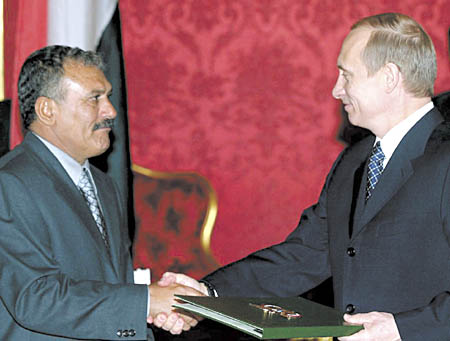
Yemen uses U.S. money to buy Russian weapons The deal [Archives:2002/52/Front Page]
December 23 2002

Yemen has been using American money to beef up its weapons stockpile with Russian-made equipment, says President Ali Abdullah Saleh.
And more purchases from Russia appear to be on the way.
The undisclosed amount of American funding came from the U.S. Central Intelligence Agency for the arms purchases from America’s former Cold War nemesis, with American knowledge, said Saleh.
“They [Americans] have given us a little money from the American Intelligence, which we used to buy a few airplanes to combat terrorism, through a negotiated contract with the Russians,” Saleh said on Friday, during an interview on MBC Satellite Television.
Yemen now spends about $540 million (YR 96 billion) on its military every year.
Russian military sources confirmed on Tuesday, that in 2002 Moscow supplied Yemen with 15 Mig-29s and more than 80 tanks.
That was disclosed while Saleh was in Russia for a four-day visit with President Vladimir Putin to sign agreements regarding economic and military issues.
Putin said Tuesday that the Soviet Union had shipped about $8 billion worth of military equipment to Yemen, Interfax reported.
On Wednesday Saleh attended a showing for MiG29 aircraft confirmed that Yemen is interested in making more purchases.
The revelation comes just two months after the international donor community met in Paris to hammer out a massive $2.3 billion loan to Yemen for its development needs, a loan that Saleh acknowledges came only with the help of the Americans.
“They encouraged donor countries such as Germany and Holland, and the International Monetary Fund and the World Bank,” he said.
Germany and Japan are responding to Yemen’s recent openness about its military spending with concern.
Herbert Sahlamann, director of the Middle East Circle for Economic Cooperation in Germany’s Ministry of Cooperation said Wednesday that German “assistance would be directed equally towards education and water.”
And Japan said it would reconsider its $20 million in annual aid to Yemen after it was discovered 10 days ago that Yemen bought 15 Scud missiles from North Korea.
Such recent developments show Saleh is now needing to leverage his diplomatic cards for maximum gain. Iraq is part of that equation.
He reiterated this week that America risks losing its international anti-terror coalition if it attacks Iraq.
In Moscow, Saleh and Russian President Vladimir Putin said the crisis in Iraq should be resolved through the United Nations.
Putin and Saleh appeared to be in full agreement over how to handle Iraq.
“The Russian and Yemeni points of view are identical as far as Iraq is concerned,” Saleh said during a 45-minute Kremlin meeting with Putin. “Iraq must cooperate fully with the United Nations in order not to give a pretext for strikes.”
Putin reiterated Moscow’s insistence that the Iraq crisis be resolved “solely in the framework of the United Nations.”…Saleh’s visit was also expected to address the two countries’ plans to increase deals in the oil and gas sectors, and in power and irrigation.
The two leaders signed a statement on friendship and cooperation in cultural, economic and military spheres, and Putin proposed that they increase cooperation in the fight against terrorism.
“Russia regards Yemen as a partner for the future,” Putin said.
Saleh also met with the speaker of the upper house of parliament, Sergei Mironov, where the Yemeni leader noted the high level of cooperation between the two countries with military goods.
After his visit to Russia, Saleh also stopped in Beruit to round out a period in the last two weeks that has seen him maneuver in complex international relations.
”Nothing justifies a strike,” against Iraq, he told Abu Dhabi’s all-news Arabic satellite channel. Saleh said ”the United States needs to preserve the international coalition to combat terrorism.’
”It could lose this coalition and the international sympathy it received as a result of the Sept. 11 terrorist attacks as well as the attacks on the [USS] Cole and the embassy in Nairobi,” Saleh said earlier to the Qatari-based Al-Jazeera television in Moscow.
Yemen is also a key partner with the United States in the war on terror, and Saleh said Yemen “has taken a balanced position in the dialogue with the United States and Russia.”
In business back home, Saleh is trying to cool al-Qaeda activities in Yemen.
He made a formal request – not his first – to Yemeni parties linked with al-Qaeda. The request tells suspected al-Qaeda that are hiding in remote mountains and deserts of the country to listen to reason and end actions that damage Yemen’s reputation around the world.
After talks with Lebanese President Emile Lahoud, Saleh also blamed Israel’s ”criminal actions” against Palestinians for regional tension.
The President started a short visit to Syria on Dec. 21 in which he held talks with his Syrian counterpart, President Bashar Al-Assad.
The two presidents exchanged views on major events including the Iraqi crisis.
Among the main points discussed were the results of the visit of President Saleh to Russia and Lebanon and the latest historic visit of Bashar Al-Assad to the UK.
The two presidents reiterated their commitment to the pan-Arab attitude, rejecting any military strike against Iraq and demanding an enforcement of the UN resolutions dealing with the Arab-Israeli conflict.
——
[archive-e:52-v:2002-y:2002-d:2002-12-23-p:./2002/iss52/front.htm]


